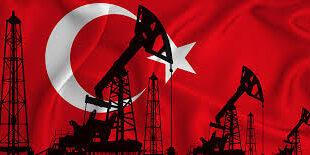The European Union’s impending sanctions on oil imports from Russia aren’t quite as exclusionary as they might seem at first sight.
While almost all direct seaborne imports of crude and refined petroleum products will both be banned by early next year, it will still be possible for what are arguably still Russian oil molecules to legitimately enter the European Union.
They just need to be arranged in a slightly different way. And that’s where oil refiners come in.
Refiners convert crude oil into fuels like gasoline and diesel. Hydrocarbon molecules that make up crude oil get boiled and separated out into different groups. There can also be further processing, where large molecules are cracked apart.
Crude oil is thus transformed into the fuels of everyday life: three carbon atoms and eight hydrogen, for instance, gives you the heating fuel propane. Diesel molecules meanwhile contain far more carbon atoms.
Upcoming sanctions
Under the EU’s upcoming sanctions, a refinery outside of the bloc will still be able to buy Russian crude oil — possibly at a much cheaper price than global crude benchmarks, depending on the final level of the price cap.
European firms will still be able to ship and insure it, provided its bought below the price cap, assuming the measure gets adopted by the G-7. If not bought under the cap they can’t, and alternative arrangements will have to be made.
But the EU’s guidance states that refined petroleum products obtained in a third country from Russian crude oil and exported from that country — or another third country — would not be subject to the sanctions as they are not deemed to be of Russian origin.
In other words, when Russia-origin crude oil comes out the other end of a refinery, having been turned into fuels like diesel and jet fuel, it can then be legitimately delivered into the EU, according to a person familiar with the bloc’s sanctions regulations. Potentially, at a big profit.
As Shell’s CEO Ben van Beurden reportedly said, before the EU’s sanctions were finalized: “Diesel coming out of a Indian refinery that was fed with Russian crude is considered to be Indian diesel.”
Still uncertain
Still, not all European refiners have been playing ball.
When Croatian refiner Ina Industrija Nafte DD recently issued tenders to buy diesel, it specified that, from February 5, they would not take product obtained from crude oil “which is originating from or exported from Russia”.
The EU’s guidance for Russian fuel that is simply mixed with non-Russian products made in other countries is less forgiving.
For example, if Russian diesel is mixed with non-Russian molecules to make a diesel product, then that product cannot be delivered into the EU, the person familiar with the rules said.
Unless, that is, the exact share of the product which does not originate in Russia can be clearly demonstrated to the national authorities of the Member State. In that case, the exact portion not originating in Russia can be allowed into the bloc.
This raises some interesting questions for diesel traders. Imagine Russia exports fuel to locations that don’t really need it once the EU stops importing in early February.
What will those locations do with their excess supply, given that Europe is something of a demand sink for diesel? And precisely how will Europe maintain its stockpiles if it can’t essentially buy back the fuel from that third country?
Only time will tell.

Model of natural gas pipeline, EU and Russia flags, July 18, 2022. REUTERS/Dado Ruvic/Illustration
 Iran Energy News Oil, Gas, Petrochemical and Energy Field Specialized Channel
Iran Energy News Oil, Gas, Petrochemical and Energy Field Specialized Channel



